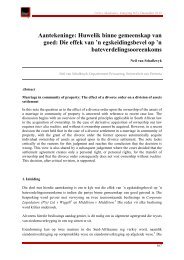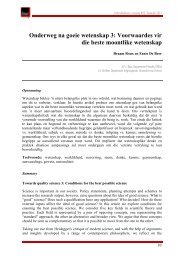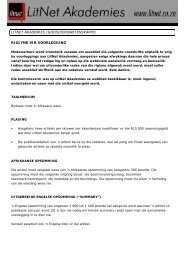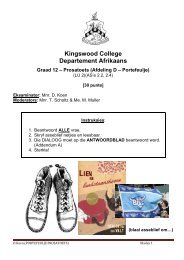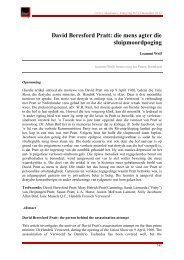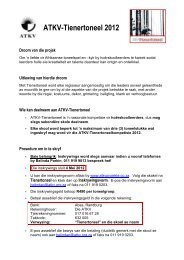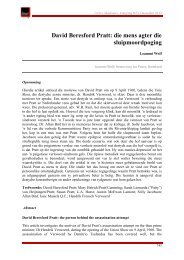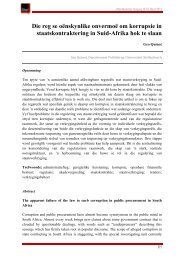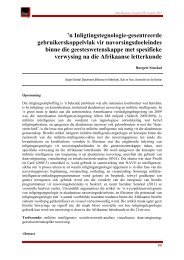Jurisdiksiegrondslae vir die vervolging van internasionale ... - LitNet
Jurisdiksiegrondslae vir die vervolging van internasionale ... - LitNet
Jurisdiksiegrondslae vir die vervolging van internasionale ... - LitNet
You also want an ePaper? Increase the reach of your titles
YUMPU automatically turns print PDFs into web optimized ePapers that Google loves.
Abstract<br />
<strong>LitNet</strong> Akademies Jaargang 9(3), Desember 2012<br />
Jurisdictional bases for the prosecution of international crimes with reference to South<br />
Africa’s obligations as a member state of the international criminal court<br />
The recent judgement of the North Gauteng high court in Southern African Litigation Centre<br />
v National Director of Public Prosecutions is the contextual background of the article. In this<br />
judgement the applicants were successful in an application to review and set aside a decision<br />
by the Director of Public Prosecutions and the South African Police Services not to<br />
investigate alleged crimes against humanity that occurred in Zimbabwe in 2009 by members<br />
of the security forces in that country against a number of Zimbabwean citizens. Incidental to<br />
this judgement, the press has also recently reported that the director of public prosecutions<br />
has agreed to investigate alleged crimes against humanity that occurred at the order of the<br />
exiled former president of Madagascar currently living in South Africa.<br />
South Africa is a member state of the Statute of Rome which created the international<br />
criminal court. The Statute of Rome has been incorporated in domestic legislation in terms of<br />
the Implementation of the Statute of Rome Act 27 of 2002. The stipulations in this act are the<br />
legal basis on which the application in the Zimbabwe case was made and in terms of which<br />
the request to the Director of Public Prosecutions to investigate the alleged slaughter in<br />
Madagascar was made earlier this year.<br />
The article sets out to describe the jurisdictional base of the international criminal court and<br />
shows that its jurisdiction is conservative in scope. It shows that in terms of the Statute of<br />
Rome it was agreed by member states that the primary responsibility to investigate and<br />
prosecute criminals on counts of genocide, crimes against humanity, war crimes and the<br />
crime of aggression (once that crime has been defined by the international community) is that<br />
of member states. This is referred to as “complementarity jurisdiction” and the concept is<br />
explained.<br />
This jurisdictional scheme is now clearly contained in South Africa’s Implementation Act.<br />
One of the cornerstone provisions of this act (following on the provisions of the Statute of<br />
Rome) is the incorporation of the international principle of universal jurisdiction. This<br />
principle has now found domestic statutory recognition in the Implementation Act. The<br />
article explains the origins and application of universal jurisdiction. It focuses on the two<br />
versions of universal jurisdiction, which, in its narrower application, requires that in order to<br />
prosecute international crimes the presence of the accused person is required on the territory<br />
of the prosecuting state. The more liberal version of universal jurisdiction is that it may be<br />
applied even in the absence of the accused person when charges are brought.<br />
The provisions of the Implementation Act in giving statutory recognition to the principle of<br />
universal jurisdiction inevitably leads to an investigation into South Africa’s legal obligations<br />
in terms of its membership of the international criminal court. These obligations and their<br />
significance with regard to ending a cycle of impunity that has traditionally attached to the<br />
perpetrators of international crimes are highlighted.<br />
Apart from the fact that the North Gauteng judgement in the Zimbabwe case was, therefore,<br />
the first occasion on which a South African court was called on to apply the stipulations of<br />
142



